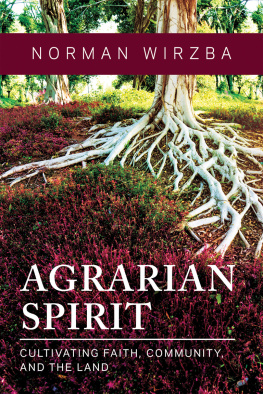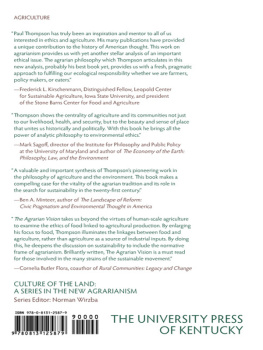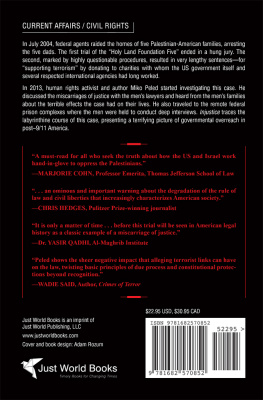First, the Statement
So bountiful hath been the earth and so securely have we drawn from it our substance, that we have taken it all for granted as if it were only a gift, and with little care or conscious thought of the consequences of our use of it; nor have we very much considered the essential relation that we bear to it as living parts in the vast creation.
It is good to think of ourselvesof this teeming, tense, and aspiring human raceas a helpful and contributing part in the plan of a cosmos, and as participators in some far-reaching destiny. The idea of responsibility is much asserted of late, but we relate it mostly to the attitude of persons in the realm of conventional conduct, which we have come to regard as very exclusively the realm of morals; and we have established certain formalities that satisfy the conscience. But there is some deeper relation than all this, which we must recognize and the consequences of which we must practise. There is a directer and more personal obligation than that which expends itself in loyalty to the manifold organizations and social requirements of the present day. There is a more fundamental co-operation in the scheme of things than that which deals with the proprieties or which centres about the selfishness too often expressed in the salvation of one's soul.
We can be only onlookers on that part of the cosmos that we call the far heavens, but it is possible to co-operate in the processes on the surface of the sphere. This co-operation may be conscious and definite, and also useful to the earth; that is, it may be real. What means this contact with our natural situation, this relationship to the earth to which we are born, and what signify this new exploration and conquest of the planet and these accumulating prophecies of science? Does the mothership of the earth have any real meaning to us?
All this does not imply a relation only with material and physical things, nor any effort to substitute a nature religion. Our relation with the planet must be raised into the realm of spirit; we cannot be fully useful otherwise. We must find a way to maintain the emotions in the abounding commercial civilization. There are two kinds of materials,those of the native earth and the idols of one's hands. The latter are much in evidence in modern life, with the conquests of engineering, mechanics, architecture, and all the rest. We visualize them everywhere, and particularly in the great centres of population. The tendency is to be removed farther and farther from the everlasting backgrounds. Our religion is detached.
We come out of the earth and we have a right to the use of the materials; and there is no danger of crass materialism if we recognize the original materials as divine and if we understand our proper relation to the creation, for then will gross selfishness in the use of them be removed. This will necessarily mean a better conception of property and of one's obligation in the use of it. We shall conceive of the earth, which is the common habitation, as inviolable. One does not act rightly toward one's fellows if one does not know how to act rightly toward the earth.
Nor does this close regard for the mother earth imply any loss of mysticism or of exaltation: quite the contrary. Science but increases the mystery of the unknown and enlarges the boundaries of the spiritual vision. To feel that one is a useful and co-operating part in nature is to give one kinship, and to open the mind to the great resources and the high enthusiasms. Here arise the fundamental common relations. Here arise also the great emotions and conceptions of sublimity and grandeur, of majesty and awe, the uplift of vast desires,when one contemplates the earth and the universe and desires to take them into the soul and to express oneself in their terms; and here also the responsible practices of life take root.
So much are we now involved in problems of human groups, so persistent are the portrayals of our social afflictions, and so well do we magnify our woes by insisting on them, so much in sheer weariness do we provide antidotes to soothe our feelings and to cause us to forget by means of many empty diversions, that we may neglect to express ourselves in simple free personal joy and to separate the obligation of the individual from the irresponsibilities of the mass.
In the beginning
It suits my purpose to quote the first sentence in the Hebrew Scripture: In the beginning God created the heaven and the earth.
This is a statement of tremendous reach, introducing the cosmos; for it sets forth in the fewest words the elemental fact that the formation of the created earth lies above and before man, and that therefore it is not man's but God's. Man finds himself upon it, with many other creatures, all parts in some system which, since it is beyond man and superior to him, is divine.
Yet the planet was not at once complete when life had appeared upon it. The whirling earth goes through many vicissitudes; the conditions on its fruitful surface are ever-changing; and the forms of life must meet the new conditions: so does the creation continue, and every day sees the genesis in process. All life contends, sometimes ferociously but more often bloodlessly and benignly, and the contention results in momentary equilibrium, one set of contestants balancing another; but every change in the outward conditions destroys the equation and a new status results. Of all the disturbing living factors, man is the greatest. He sets mighty changes going, destroying forests, upturning the sleeping prairies, flooding the deserts, deflecting the courses of the rivers, building great cities. He operates consciously and increasingly with plan aforethought; and therefore he carries heavy responsibility.
This responsibility is recognized in the Hebrew Scripture, from which I have quoted; and I quote it again because I know of no other Scripture that states it so well. Man is given the image of the creator, even when formed from the dust of the earth, so complete is his power and so real his dominion: And God blessed them: and God said unto them, Be fruitful, and multiply, and replenish the earth, and subdue it; and have dominion over the fish of the sea, and over the fowl of the air, and over every living thing that moveth upon the earth.
One cannot receive all these privileges without bearing the obligation to react and to partake, to keep, to cherish, and to co-operate. We have assumed that there is no obligation to an inanimate thing, as we consider the earth to be: but man should respect the conditions in which he is placed; the earth yields the living creature; man is a living creature; science constantly narrows the gulf between the animate and the inanimate, between the organized and the inorganized; evolution derives the creatures from the earth; the creation is one creation. I must accept all or reject all.










